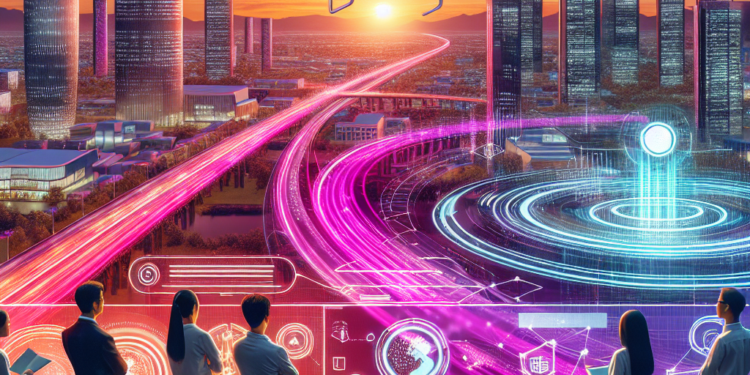With the rapid advancement of technology and the increasing urbanization of populations around the world, the concept of smart cities has become increasingly relevant in recent years. Smart cities leverage innovative technologies to improve the quality of life for residents, enhance sustainability, and optimize the efficiency of urban infrastructure. One of the key technologies driving the development of smart cities is artificial intelligence (AI). In this expert guide, we will explore the role of AI in smart cities and how it is revolutionizing urban living.
AI refers to the simulation of human intelligence in machines that are programmed to think and learn like humans. In the context of smart cities, AI plays a crucial role in collecting and analyzing vast amounts of data from various sources to make informed decisions and improve the overall functioning of urban ecosystems. By leveraging AI technologies, smart cities can optimize energy consumption, manage traffic flow, enhance public safety, and provide better services to residents.
One of the key areas where AI is making a significant impact in smart cities is transportation. Traffic congestion is a major issue in urban areas, leading to increased pollution, longer commute times, and decreased quality of life for residents. AI-powered traffic management systems can help cities optimize traffic flow, reduce congestion, and improve overall transportation efficiency. By analyzing real-time data from sensors, cameras, and other sources, AI algorithms can predict traffic patterns, suggest alternative routes, and adjust traffic signals to minimize delays.
In addition to traffic management, AI is also being used to improve public transportation systems in smart cities. By analyzing data on ridership, travel patterns, and service schedules, AI algorithms can help optimize bus routes, improve the accuracy of arrival times, and enhance the overall user experience for commuters. Smart cities are also exploring the use of autonomous vehicles powered by AI to provide on-demand transportation services, reducing the need for private car ownership and decreasing traffic congestion.
AI is also revolutionizing public safety in smart cities. By analyzing data from surveillance cameras, social media feeds, and other sources, AI-powered systems can detect and respond to potential threats in real-time. For example, AI algorithms can help police departments identify criminal activity, track suspects, and deploy resources more effectively. Similarly, AI technologies can be used to improve emergency response times by analyzing data on incidents, traffic conditions, and weather patterns to dispatch first responders more efficiently.
Another key area where AI is making a significant impact in smart cities is energy management. By analyzing data on energy consumption, weather patterns, and building systems, AI algorithms can help optimize energy usage, reduce costs, and enhance sustainability. For example, AI-powered systems can adjust heating and lighting levels in buildings based on occupancy rates, weather conditions, and energy prices to minimize waste and improve efficiency. Smart cities are also exploring the use of AI to optimize energy grids, integrate renewable energy sources, and reduce overall carbon emissions.
AI is also transforming healthcare in smart cities by enabling more personalized and efficient services for residents. By analyzing data from wearable devices, electronic health records, and other sources, AI algorithms can help healthcare providers diagnose diseases, predict health outcomes, and recommend personalized treatment plans. Smart cities are also leveraging AI-powered chatbots and virtual assistants to provide round-the-clock medical advice, schedule appointments, and monitor patient progress remotely.
In addition to transportation, public safety, energy management, and healthcare, AI is being used in smart cities to improve a wide range of other services and infrastructure. For example, AI-powered systems can help optimize waste management by analyzing data on recycling rates, collection schedules, and disposal routes to reduce costs and improve sustainability. Similarly, AI technologies can be used to enhance water management by monitoring and analyzing data on water quality, consumption rates, and distribution networks to detect leaks, prevent contamination, and optimize usage.
While AI holds great promise for improving the efficiency and sustainability of smart cities, there are also challenges and considerations that must be addressed. One of the key challenges is ensuring the privacy and security of data collected and analyzed by AI systems. Smart cities must implement robust data protection measures, encryption protocols, and cybersecurity strategies to safeguard sensitive information and prevent unauthorized access or breaches.
Another challenge is ensuring the ethical and responsible use of AI in smart cities. As AI technologies become more advanced and integrated into everyday life, there is a growing concern about potential biases, discrimination, and unintended consequences. Smart cities must establish guidelines, regulations, and oversight mechanisms to ensure that AI systems are fair, transparent, and accountable in their decision-making processes.
In conclusion, AI is playing a transformative role in shaping the future of smart cities around the world. By harnessing the power of AI technologies, cities can optimize transportation systems, enhance public safety, improve energy management, transform healthcare services, and provide better overall quality of life for residents. While there are challenges and considerations to address, the potential benefits of AI in smart cities are immense and will continue to drive innovation and progress in urban living for years to come.













